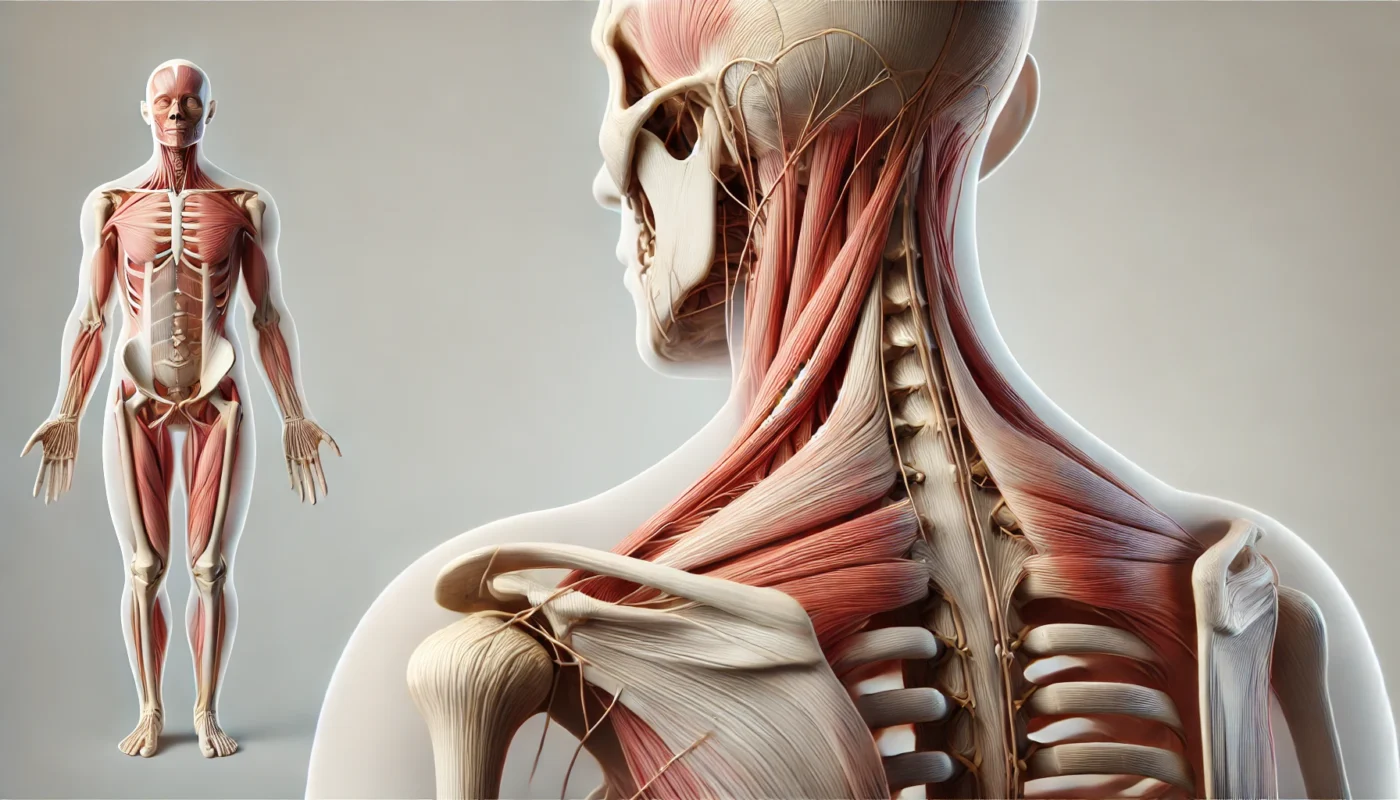Neck and shoulder pain can be a real hindrance. It can limit your mobility, disrupt your daily activities, and significantly impact your quality of life.
But what if there were natural ways to manage this discomfort?
This article explores the role of vitamins and supplements in supporting neck and shoulder health. We delve into the science behind their potential benefits and provide practical advice on how to incorporate them into your lifestyle.
Whether you’re a fitness enthusiast recovering from an intense workout, a health enthusiast seeking to optimize your wellbeing, or a medical patient managing a health condition, this article is for you.
We’ll discuss a range of vitamins, from Vitamin D to Omega-3 fatty acids, and their potential impact on neck and shoulder pain. We’ll also explore other natural supplements and lifestyle factors that can contribute to pain relief and overall health.
Remember, while vitamins and supplements can be beneficial, they should not replace medical advice. Always consult with a healthcare provider before starting any new regimen.
Ready to learn more? Let’s dive into the world of vitamins for neck and shoulder health.
You May Also Like: Natural NSAIDs: Benefits and Side Effects
Understanding Neck and Shoulder Pain
Neck and shoulder pain are common complaints that affect many people. They can stem from various causes and impact daily activities. Understanding the underlying factors is crucial for effective management.
The pain can originate from different sources. Muscular strains, poor posture, and sedentary lifestyles are frequent culprits. Injuries, like whiplash or falls, can also lead to significant discomfort.
Chronic conditions can contribute to persistent pain. Arthritis and degenerative disc disease are known to affect the neck and shoulders. Stress and tension often manifest physically, adding to the burden of pain.
Common causes of neck and shoulder pain include:
- Poor posture while sitting or standing
- Repetitive movements or overuse
- Injury or trauma
- Stress and tension
Identifying the root cause is key. It helps in choosing the most appropriate treatment. For some, simple lifestyle changes may suffice. Others might need a more comprehensive approach involving therapy and medication.
It’s important to pay attention to pain signals. Ignoring or suppressing them can lead to worsened conditions. By addressing the pain early, one can prevent it from becoming a chronic issue.
Lastly, seeking professional advice is advisable. A healthcare provider can offer insights into the cause and best treatment options. Understanding pain’s origin is the first step towards effective relief and prevention.
The Role of Vitamins in Pain Relief and Tissue Recovery
Vitamins play a crucial role in maintaining our body’s overall health. They are essential for pain relief and aiding tissue recovery, especially in the neck and shoulder regions. Understanding their functions can help us utilize these nutrients more effectively.
Several vitamins possess properties that are particularly beneficial for reducing inflammation. Inflammation is a common contributor to pain in the neck and shoulders. By incorporating vitamins that combat this condition, we can assist the body’s natural healing processes.
Specifically, some vitamins aid in the repair of damaged tissues. They are vital in collagen production, which strengthens connective tissues. This can lead to improved stability and fewer injuries over time.
Some key vitamins that aid in pain relief and tissue recovery include:
- Vitamin D for bone health
- Vitamin B complex for nerve function
- Vitamin C for collagen synthesis
- Vitamin E for anti-inflammatory effects
Vitamins support the body’s immune system, an important aspect often overlooked in pain management. A strong immune system can prevent infections and accelerate recovery from injuries. Vitamins like Vitamin C and E bolster these defenses significantly.
Additionally, these essential nutrients also help support nerve function. Healthy nerves are vital for reducing pain and discomfort. Vitamins like B complexes are known to support nerve health, helping mitigate neural-related pain issues.
Incorporating a balanced diet rich in these essential vitamins ensures optimal neck and shoulder health. Supplements might also be considered, especially for those unable to meet their needs through diet alone. It’s wise to evaluate dietary gaps and explore options to fill them for overall wellbeing.

Vitamin D: Sunshine for Your Bones
Vitamin D is often dubbed the “sunshine vitamin” because our bodies synthesize it when exposed to sunlight. This vital nutrient plays a crucial role in maintaining bone health and can help manage neck and shoulder pain. It ensures that calcium, another important mineral, is absorbed effectively, contributing to stronger bones.
Strong bones are essential for supporting the weight and movement of our upper body. When bones are healthy, the risk of pain and injury diminishes considerably. Vitamin D deficiency can lead to weaker bones, increasing the likelihood of conditions like osteoporosis, which can exacerbate neck and shoulder issues.
It’s important to include dietary sources of Vitamin D in your routine, especially if you have limited sun exposure. Foods rich in Vitamin D, such as fatty fish, egg yolks, and fortified foods, can help maintain adequate levels. Supplements are another option, but it’s always advisable to consult a healthcare provider before making any significant changes to your vitamin intake.
The B Complex: Nerves and Inflammation
The B Complex vitamins consist of several B vitamins that are pivotal for nerve health and reducing inflammation. They include B1, B6, and B12, each playing a unique role in maintaining neurological functions and reducing discomfort. These vitamins help the body’s ability to heal nerve tissues, which is crucial in managing pain.
Vitamin B6, for instance, is known for supporting normal brain development and ensuring the nervous system functions properly. It assists in lowering inflammation, which can help alleviate pain in the neck and shoulders. Chronic inflammation is a known contributor to persistent discomfort and joint issues.
Incorporating foods rich in B vitamins into your diet can be beneficial. Whole grains, legumes, seeds, nuts, and green leafy vegetables are excellent sources of these nutrients. For some, supplements may also be a practical choice, particularly for those with dietary restrictions. Always seek advice from a health professional before starting any supplement regimen to ensure it meets your specific needs.
Vitamin C: The Building Block of Collagen
Vitamin C is vital for producing collagen, a key protein in connective tissues. Healthy collagen levels ensure strong ligaments and cartilage, reducing neck and shoulder pain. A deficiency in vitamin C could impair tissue repair, leading to sustained discomfort.
Besides structural support, vitamin C also acts as an antioxidant, protecting cells from damage caused by free radicals. This protection can help mitigate inflammation, which often exacerbates pain in the neck and shoulders. Therefore, maintaining adequate vitamin C levels is essential for healing and pain relief.
Consuming fruits and vegetables high in vitamin C can bolster your body’s collagen production. Foods like oranges, strawberries, bell peppers, and broccoli are excellent choices. If dietary sources are insufficient, vitamin C supplements may be considered under professional guidance. This approach ensures you meet your body’s requirements and support your overall joint health effectively.
Omega-3 Fatty Acids: Anti-inflammatory Powerhouses
Omega-3 fatty acids are renowned for their strong anti-inflammatory properties. These essential fats are crucial for reducing inflammation, a common cause of neck and shoulder pain. Research shows that omega-3s can help decrease joint tenderness and stiffness, offering relief to those suffering from musculoskeletal discomfort.
These fatty acids are found in high concentrations in fatty fish like salmon, mackerel, and sardines. Including these fish in your diet a couple of times a week can significantly increase your omega-3 intake. If fish isn’t your favorite, flaxseeds and walnuts are excellent plant-based alternatives.
Omega-3 supplements, such as fish oil or algae oil capsules, provide a convenient way to boost your intake. Always ensure these supplements are high quality and from reputable sources. Incorporating omega-3s into your routine can support better joint health and promote overall well-being.
Magnesium: The Muscle Relaxer
Magnesium is essential for muscle function and relaxation. It plays a key role in preventing muscle cramps and spasms, which often contribute to neck and shoulder pain. This mineral helps regulate muscle contractions and nerve signals, making it vital for those experiencing tension and stiffness in these areas.
Green leafy vegetables, nuts, seeds, and whole grains are excellent sources of magnesium. Incorporating these foods into your diet can help maintain optimal magnesium levels. For those with higher needs or dietary restrictions, magnesium supplements can be a beneficial option to ensure adequate intake.
Taking a warm bath with Epsom salts, which contain magnesium sulfate, can also relax muscles and soothe soreness. Whether through diet, supplements, or topical application, maintaining sufficient magnesium levels can be a crucial step towards achieving muscle relief and overall comfort.

Glucosamine and Chondroitin: Joint Health Allies
Glucosamine and chondroitin are compounds naturally found in cartilage. They are known for their supportive role in joint health. These supplements can be beneficial for those with neck and shoulder pain, especially when the pain is linked to joint wear and tear.
Glucosamine is believed to support cartilage repair and reduce joint inflammation. This makes it a popular choice for individuals looking to maintain joint function. Meanwhile, chondroitin may help retain water in the cartilage, keeping joints lubricated and flexible.
Research suggests these supplements might slow the progression of joint degeneration. They could also provide some pain relief, although results vary among individuals. As with any supplement, consulting with a healthcare provider is recommended, particularly if you have underlying health conditions or are taking other medications.
Calcium: Strong Bones, Less Pain
Calcium is crucial for maintaining bone health. It is well-known for its role in building strong bones and preventing osteoporosis. Strong bones are less prone to fractures and can better support muscles, which is essential for reducing neck and shoulder pain.
Calcium works by binding to bone tissues, strengthening their structure. This is particularly significant as we age since bone density tends to decrease over time. Ensuring adequate calcium intake can thus contribute to less pain and a healthier posture.
However, too much calcium can lead to unwanted side effects, such as kidney stones. It is important to balance calcium intake with other nutrients like vitamin D, which helps absorb calcium effectively. Speak with a healthcare professional to determine the right amount for your needs, especially if you consider taking calcium supplements to aid neck and shoulder health.
Herbal and Natural Supplements for Pain Relief
Beyond vitamins, several herbal and natural supplements hold promise for alleviating neck and shoulder pain. These options often come with fewer side effects and can be easily incorporated into daily routines. Many people find value in their holistic approach to wellness.
Turmeric is one of the most popular herbal supplements for reducing inflammation. Its active compound, curcumin, is known for its potent anti-inflammatory properties. Studies suggest that it can effectively diminish joint pain and improve mobility.
In addition to turmeric, ginger is another potent natural anti-inflammatory. Used for centuries in traditional medicine, ginger may help with muscle soreness and joint pain. It can be consumed as a tea or in supplement form, offering a simple way to enhance your diet.
Here are some popular herbal and natural supplements:
- Turmeric/Curcumin: Anti-inflammatory properties may relieve joint pain.
- Ginger: Reduces muscle soreness and joint discomfort.
- Willow Bark: Known as nature’s aspirin for pain relief.
- Capsaicin: Found in chili peppers, may alleviate muscle and joint pain.
Willow bark, sometimes referred to as nature’s aspirin, contains salicin, a compound with pain-relieving capabilities. It has been used to ease various pains, including back and joint pain, making it a valuable addition to a natural pain management arsenal.
Lifestyle Factors: Exercise, Posture, and Stress Management
Lifestyle choices play a pivotal role in managing neck and shoulder pain. Small adjustments can lead to significant improvements in how you feel daily. Incorporating strategic habits can enhance recovery and reduce discomfort.
Exercise is essential for maintaining flexibility and strength. Engaging in regular physical activity, focusing on aerobic, strength, and flexibility exercises, can support joint health. A mix of these exercises helps maintain muscle tone, alleviating strain on your neck and shoulders.
Posture is another critical factor in preventing pain. Many individuals spend long hours seated at desks, which can lead to poor posture and tension. Ensuring proper ergonomics at your workstation can help. Adjust your chair, monitor, and keyboard to promote a more natural and comfortable sitting position.
Stress management is equally important as physical adjustments. Stress often manifests as muscle tension, particularly in the neck and shoulders. Incorporating techniques like mindfulness, meditation, and deep breathing can be beneficial. These practices can help relax tense muscles and improve overall wellbeing.
To sum up, here are practical lifestyle changes to consider:
- Regular exercise focused on flexibility and strength.
- Maintain good posture and ergonomic desk setup.
- Practice stress-reducing techniques like mindfulness and meditation.
These adjustments can complement your vitamin regimen, promoting a holistic approach to managing neck and shoulder health effectively.
Incorporating Vitamins into Your Daily Routine
Incorporating vitamins and supplements into your daily routine requires a strategic approach. Consistency is crucial for seeing benefits over time. Start by identifying the vitamins best suited to your needs, which might include Vitamin D, Vitamin C, or Omega-3 fatty acids.
Plan your intake in a way that complements your meal schedule. For instance, fat-soluble vitamins like Vitamin D and Omega-3s are best absorbed with meals containing fats. Meanwhile, Vitamin C can be taken on an empty stomach or with food, depending on your preference and tolerance.
Using reminders or integrating your supplements into an established routine can help maintain consistency. Setting alarms or pairing vitamin intake with daily activities like breakfast or bedtime can ensure you don’t miss a dose. This regularity maximizes absorption and ensures you’re receiving optimal benefits from your vitamin regimen.
When to Consult a Healthcare Provider
Consulting a healthcare provider is essential before beginning any supplement regimen. This is particularly true if you have underlying health conditions or are currently on medications. A healthcare professional can help prevent potential adverse interactions and ensure that your vitamin intake is both safe and effective.
Additionally, if you experience persistent pain that does not improve with lifestyle changes and supplements, seek medical advice. It might indicate a more serious condition that requires professional assessment. Remember, personalized guidance is invaluable in navigating the diverse landscape of vitamins and supplements.

Conclusion: A Holistic Approach to Neck and Shoulder Health
Incorporating vitamins and supplements can be a significant step toward alleviating neck and shoulder pain. Combined with lifestyle modifications, such as improving posture and managing stress, these interventions can enhance overall wellbeing. It’s vital to adopt a balanced strategy that addresses both physical and mental health.
Remember, the journey to optimal neck and shoulder health is ongoing. By maintaining consistency in your efforts and remaining informed about new research, you can make informed choices that support long-term wellness. A holistic approach, blending nutrition, exercise, and mindfulness, offers the best path to a pain-free life.
Further Reading:
Prevention: 29 Neck Pain Remedies
Arthritis Foundation: Popular Supplements for Arthritis: What You Need to Know
The Permanente Journal: Treating Vitamin D Deficiency and Insufficiency in Chronic Neck and Back Pain and Muscle Spasm: A Case Series
calcium, bone health, osteoporosis, neck pain, shoulder pain, herbal supplements, natural remedies, turmeric, ginger, willow bark, exercise, posture, stress management, vitamins, vitamin D, vitamin C, Omega-3 fatty acids, holistic health, pain relief, wellness, nutrition
Important Note: The information contained in this article is for general informational purposes only, and should not be construed as health or medical advice, nor is it intended to diagnose, prevent, treat, or cure any disease or health condition. Before embarking on any diet, fitness regimen, or program of nutritional supplementation, it is advisable to consult your healthcare professional in order to determine its safety and probable efficacy in terms of your individual state of health.
Regarding Nutritional Supplements Or Other Non-Prescription Health Products: If any nutritional supplements or other non-prescription health products are mentioned in the foregoing article, any claims or statements made about them have not been evaluated by the U.S. Food and Drug Administration, and such nutritional supplements or other health products are not intended to diagnose, treat, cure, or prevent any disease.

